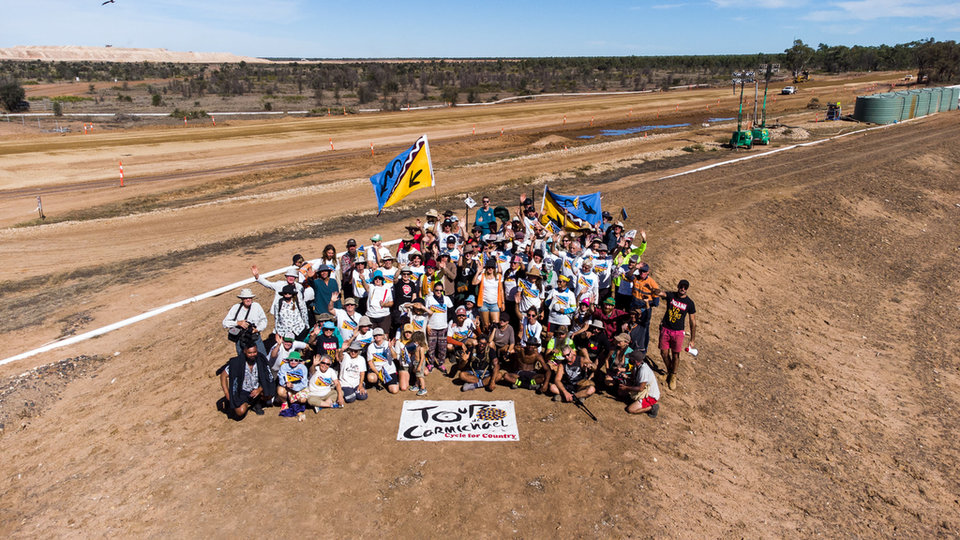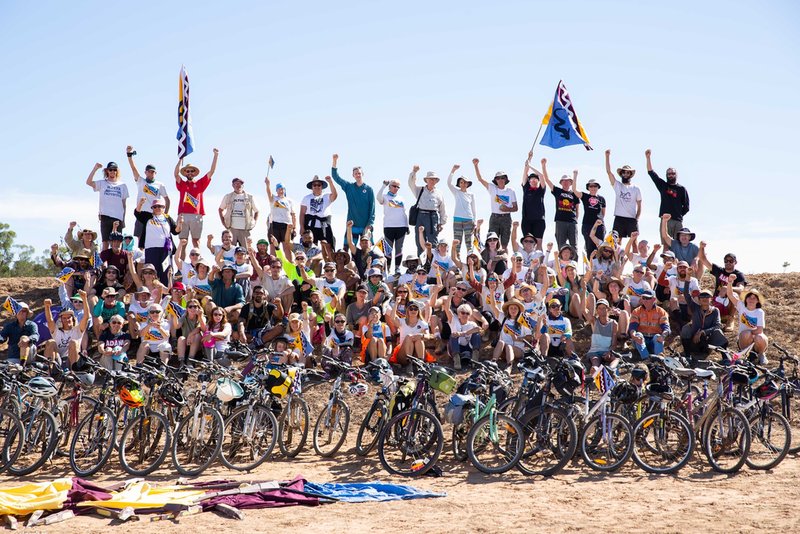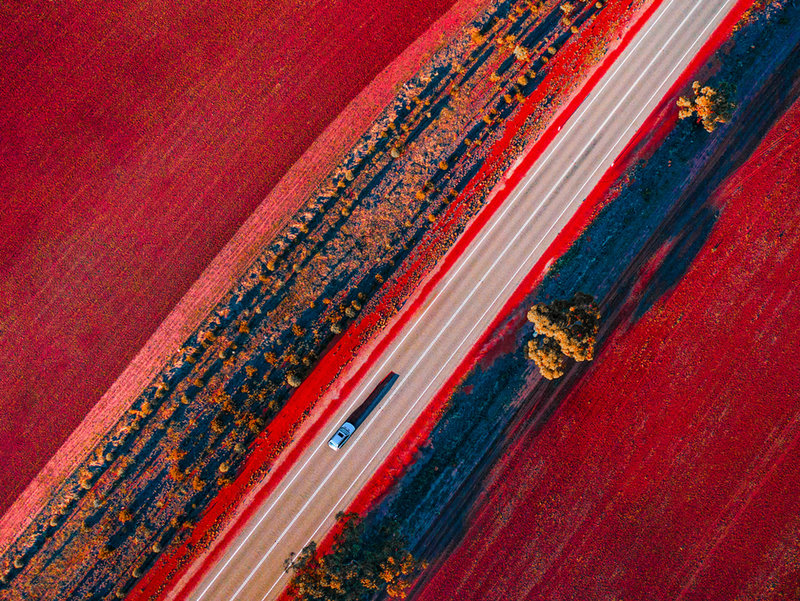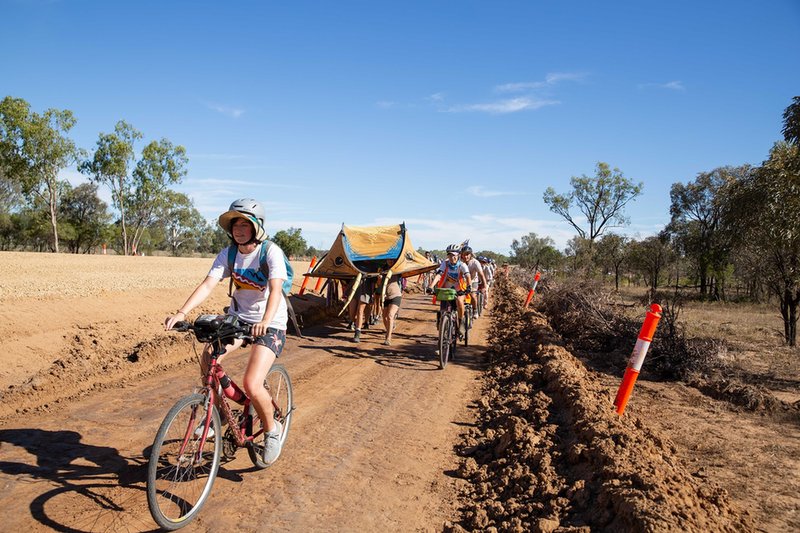
COMMUNITY
Tour de Carmichael: opposing Australia’s most controversial coal mine
The Carmichael coal mine in Queensland, Australia is one of the most contested in the country. As part of an ongoing movement to oppose its construction, Wangan and Jagalingou Traditional Owner, Coedie Burragubba, has conceived a novel form of resistance. Heidi Vella finds out more.
"W
e want everyone to come to our homelands,” said Codie Burragubba, a Wangan and Jagalingou Traditional Owner, in an advertisement inviting participants to a five-day, 105km guided cycle tour of traditional ceremonial ground, including the sacred Doongmabulla Springs.
The tour, which took place in May and was called the Tour de Carmichael, promised to offer a ‘once in a lifetime opportunity’ to learn about Wangan and Jagalingou Totems and culture. An interesting tourist attraction, one might think. Except, this was no ordinary excursion, but an organised protest against the construction of one of Australia’s most strongly contested mines: the Carmichael Coal mine.
“The main aim is to stop the destruction of our homelands,” says Burragubba. “There’s no good reason to open-up the Galilee basin, where my traditional area is, to coal mining. It will create massive devastation to wildlife, to our Totems and our beliefs that are tied within this land.”
Raising awareness
The Carmichael Coal mining project in Queensland belongs to Bravus Mining & Resources, which was formerly Adani Mining, named after billionaire Indian owner Gautum Adani. The project was given final federal approval in 2019.
When it was first proposed 10 years ago, it was set to be one of the worlds’ biggest coal mines. However, although plans have since been significantly scaled back, it’s believed that further coal projects could be developed nearby. Once operational, it will produce 10 million tonnes of thermal coal per annum.
The activists believe the mine will significantly impact the nearby Doongmabulla Springs, a system of 160 separate wetlands.
In May, construction plans were stalled when the Australian Conservation Foundation successfully got the mine owners’ plans to pump 12.5 billion litres of water a year from a Queensland river overturned in court. The activists believe the mine will significantly impact the nearby Doongmabulla Springs, a system of 160 separate wetlands.
Since 2012, Burragubba’s father, Adrian, has spent many years contesting the mine in the courts, a process that Coedie says resulted in his bankruptcy. Now his father is older, Burragubba is taking over the mantle to continue to fight the project’s development.
He decided to organise the Tour de Carmichael – which was inspired by the Tour de France – to raise awareness of his people’s plight. Setting off on 3 May, the roughly 100-strong tour travelled through farmlands and along the 85km-long public road to the entrance of Adani’s construction site, its final destination.

Sharing traditional culture
Along the journey, Burragubba shared stories and information about his culture, and stops were taken for eating, dancing, and swimming in the Belyando River, which forms the border between Wangan and Jagalingou country.
In 2019, the Burragubba family built a campsite around 5km from the Carmichael mine construction camp, which was the main campsite for the tour. Despite the police trying to shut it down, the Human Rights Commission allowed the camp to remain because the family are traditional landowners.
Burragubba says that it took three days to reach the camp and they left on the fifth day.
My beef isn't with those workers, it’s with Adani.
“It's great that there are so many people who have the same vision and the same goals of making sure this guy [Adani] packs up and leaves,” he says.
Burragubba says that the tour, which was supported by a police escort, was received by mine workers with "mixed emotions", with some being upset by their presence, while others "don’t take anything personally", he says.
“My beef isn't with those workers, it’s with Adani,” he says.
A history of opposition to the Carmichael mine
The Tour de Carmichael is one of several acts of protest conducted by Burragubba. In 2019, he built a stone dancing circle on unallocated state land. The year after, he blockaded the main road to the mine with a fire for four days.
Burragubba is keen to highlight that he can hold these unusual acts of protest because he is a traditional landowner practising his culture, which gives him special access to the land.
“It gives people food for thought, to think, ‘not any normal person could just go and do something like that. How can he do it?’ I can do it because I am practising my culture on my traditional lands, which is my human right,” he explains.
His family are not the only movement opposing the controversial mine. Front Line Action On Coal and Stop Adani are both organised groups running campaigns to get the mine closed down.
It's pretty simple, we really shouldn't be building new coal mines and instead should be tackling climate change.
The opposition surrounding the project has caused challenges for its owners. Last year, Samsung Securities pulled financial backing for the mine and more than 30 financial institutions have refused to finance the project. Some have questioned the economics of the mine altogether.
Isaac Regional Council, which had supported the mine on the basis it would boost the local economy, unanimously passed a motion in February expressing ‘strong dissatisfaction’ over the mine owners’ handling of the project. It said that the council was disappointed with the treatment of local landholders and the miners’ non-compliance with some of their obligations. Adani Mining had previously been fined for environmental breaches.
Dr Gavin Mudd, an associate professor at RMIT University in Victoria and an expert in groundwater, says that the project shouldn’t go ahead.
“The Carmichael mine presents significant risks, including climate change and to water resources - it's pretty simple, we really shouldn't be building new coal mines and instead should be tackling climate change. Unfortunately, we have politicians, both at the federal and state level, that don't get that,” he says.


Continued resistance
The Carmichael mine owners dispute the claims of Burragubba and others that oppose its construction. It previously told us: “The project must comply with a strict regulatory framework to ensure groundwater is protected.
“The state and federal government approvals for the Carmichael Mine include around 100 different conditions relating to groundwater…The mine’s approvals also include provisions to protect the Doongmabulla Springs; these state that the water level in the springs cannot drop more than 20cm.”
Furthermore, they insist that the company had “engaged every step of the way” with the traditional owners. An indigenous land-use agreement was approved by seven of 12 native title applicants.
However, Burragubba claims Aboriginal people have been pressured by the government into signing their property away “on a massive scale” through the Native Title Act brought in in 1993. This is the recognition in law that Aboriginal and Torres Strait Islander people have rights and interests to land and waters according to their traditional law and customs. However, it also states that native title can co-exist with or be extinguished by others.
It's not just about the mine for me now, it's about who really owns the land.
“It’s a Pandora's box we’re opening. We want to save the springs, which has in turn blown-up to something bigger; it's not just about the mine for me now, it's about who really owns the land,” he says
“In the last 10 years, indigenous people are becoming better equipped with knowledge of the legal system than they did 20-30 years ago and they have more support behind them,” he adds.
Burragubba has around 100,000 supporters that help finance his actions and enable him to keep protesting the mine. Going forward, he plans to make the Tour de Carmichael an annual event, and even bigger next year.
“Other indigenous people can gain strength from what I'm doing and be encouraged to do something similar,” he says.
// All images credit: Tour de Carmichael